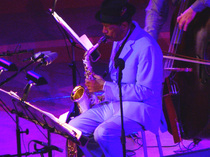Ornette Coleman boots you and reboots you. He greets you and defeats you. Perched on his high stool, lost in the folds of a ridiculous electric-blue suit, this little old feller in a porkpie hat smiles like a Zen monk and slaps you repeatedly. You get it yet? Slap. Howbout now? Slap. Now? Now? Now? Slap. Slap. Slap.
All who were stuffed into the old auditorium of academia burbled and clapped and twice gave the O-man the standing O as if we got it, but we didn't truly get it. Ornette can unplug us again and again, make our brains start over, but we'll wake up tomorrow with the same old memories; he can't wipe those. We remain only temporarily diverted from our futility.
This disorientation Ornette engenders, this temporary forgetting, though, it's some experience. I've seen his groups five times now, and it never fails to amaze me how he can get large numbers of people to sit still for such weird music. His quintet plunged right in with a hardcore taste of things to come -- four guys soloing simultaneously in what sounded like four different keys, yet somehow not clashing. It's a philosophy, and it possesses its own wisdom.
Ornette brought three basses this time -- three -- but two didn't sound like basses. On the left, balding hump Tony Falanga spent nearly all his time bent over his upright, bowing way up by the bridge. On the right, Al McDowell, decorously poised on a metal high chair, plucked mostly the trebliest registers of his electric five-string, adding frequent dollops of wah-wah chutney. Why two basses, not a cello and a guitar in their proper spectra? Ponder deeply, my child.
The third bassist was the stylin' Charnett Moffett (son of long-ago O drummer Charles Moffett, who died in 1997), and he played more or less a rhythm-section role, somehow interpolating walks and grooves as his fingers fluttered up and down his contra's neck. (All three bassists were technically astounding.) Moffett also got to stand in the fun zone, next to the drums of Ornette's eternally youthful 51-year-old son Denardo, who powered the proceedings with constant improvisations that nevertheless retained a rocklike regularity.
Up front on his catbird seat in front of the only music stands on view sat Ornette, conducting via (in diminishing order of use) his cleanly wailing alto sax, his percussively blurting trumpet and his noisily hoedowning fiddle. He ended many songs with a sudden extended thematic riff, and his well-rehearsed band inerrantly synchronized to a cement-wall stop.
The quintet played several songs from last year's Grammy-winning "Sound Grammar" album, contrasting the fitful energy of "Jordan" with the disturbed somnolence of "Sleep Talking." In terms of "hits," the hysterical energy of the nagging "Dancing in Your Head" and an India-droning encore of the classic dirge "Lonely Woman" provided welcome signposts. A couple of new titles -- "911" and "Those Who Know Before It Happens" -- signaled the kind of somber thoughts that've been occupying Ornette; one selection, reminiscent of Charlie Haden's "Song for Che," stood out in steady rhythm and desolate mood as a literal death march, the most joyless thing I've ever heard him do, and one of the most emotionally affecting.
The night's keynote, though, was shattered preconceptions. Falanga bowed a gorgeous arpeggiated Bach theme only to let Denardo shitkick the rhythm and Ornette intertwine cunning little countermelodies that made me hear it entirely differently. The band swung into what sounded like it was going to be an unprecedented straight rendition of Harold Arlen's "Blues in the Night" or some such chestnut, then flexed the tempo and reharmonized it, and Ornette's wild squeal completed the trip to no man's land. In the middle of this or that bubbling group mindfuck, we'd catch a snatch of "The Star-Spangled Banner." Or was that "Have Yourself a Merry Little Christmas"? Or "The Way You Look Tonight"?
I don't know how long the effect normally lasts, but many listeners must have found it hard to concentrate on their desk jobs the next day. After Ornette, many new things seem possible.
"The sound is not notes," whispered Ornette, introducing his first song, "Following the Sound." "It's your own heartbeat of love, happiness and security." He hardly said a word after that. He didn't need to.

